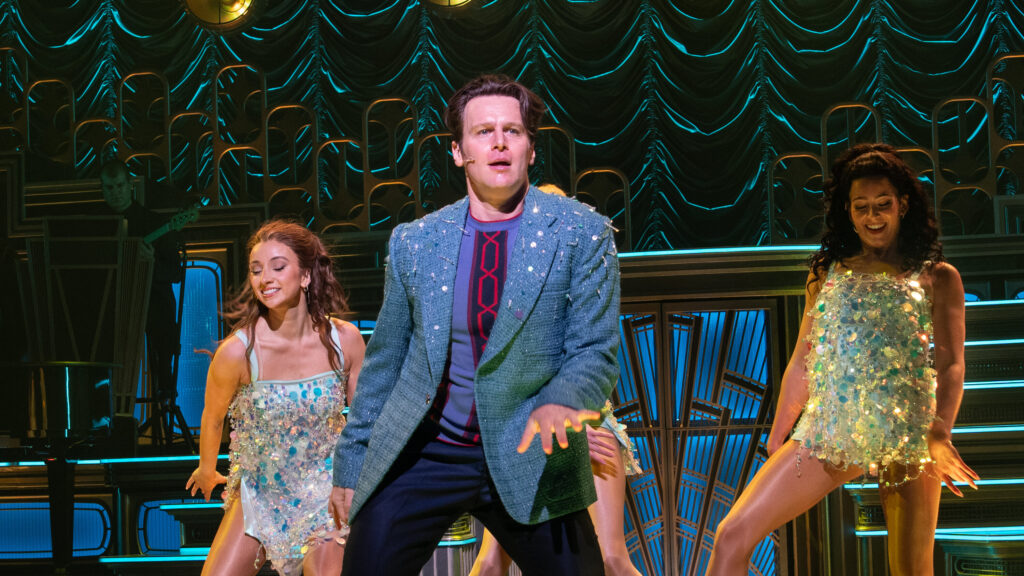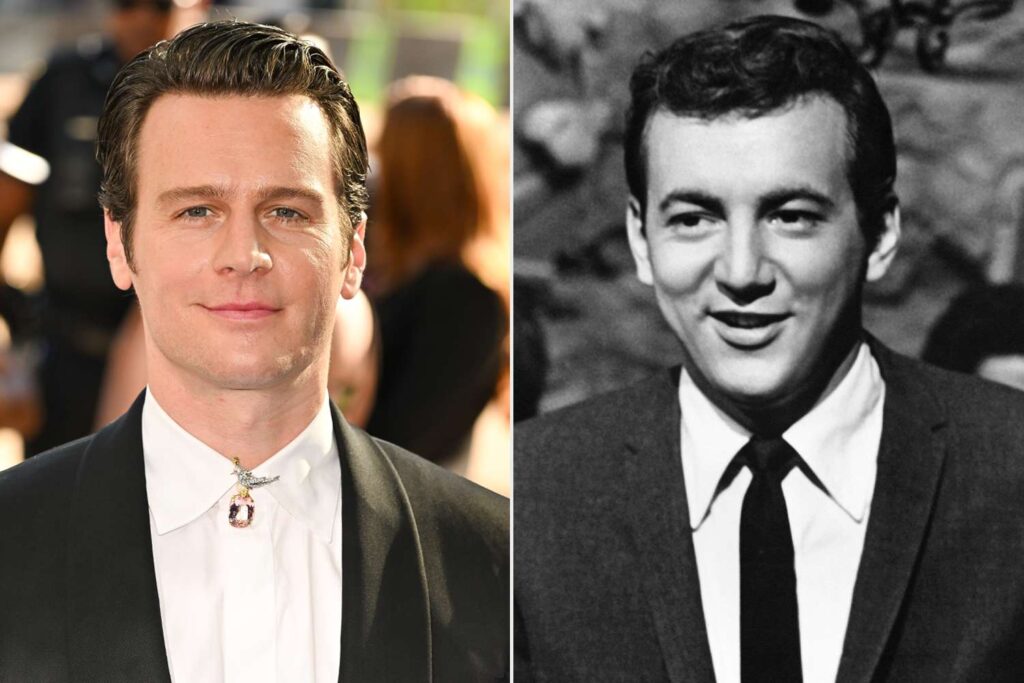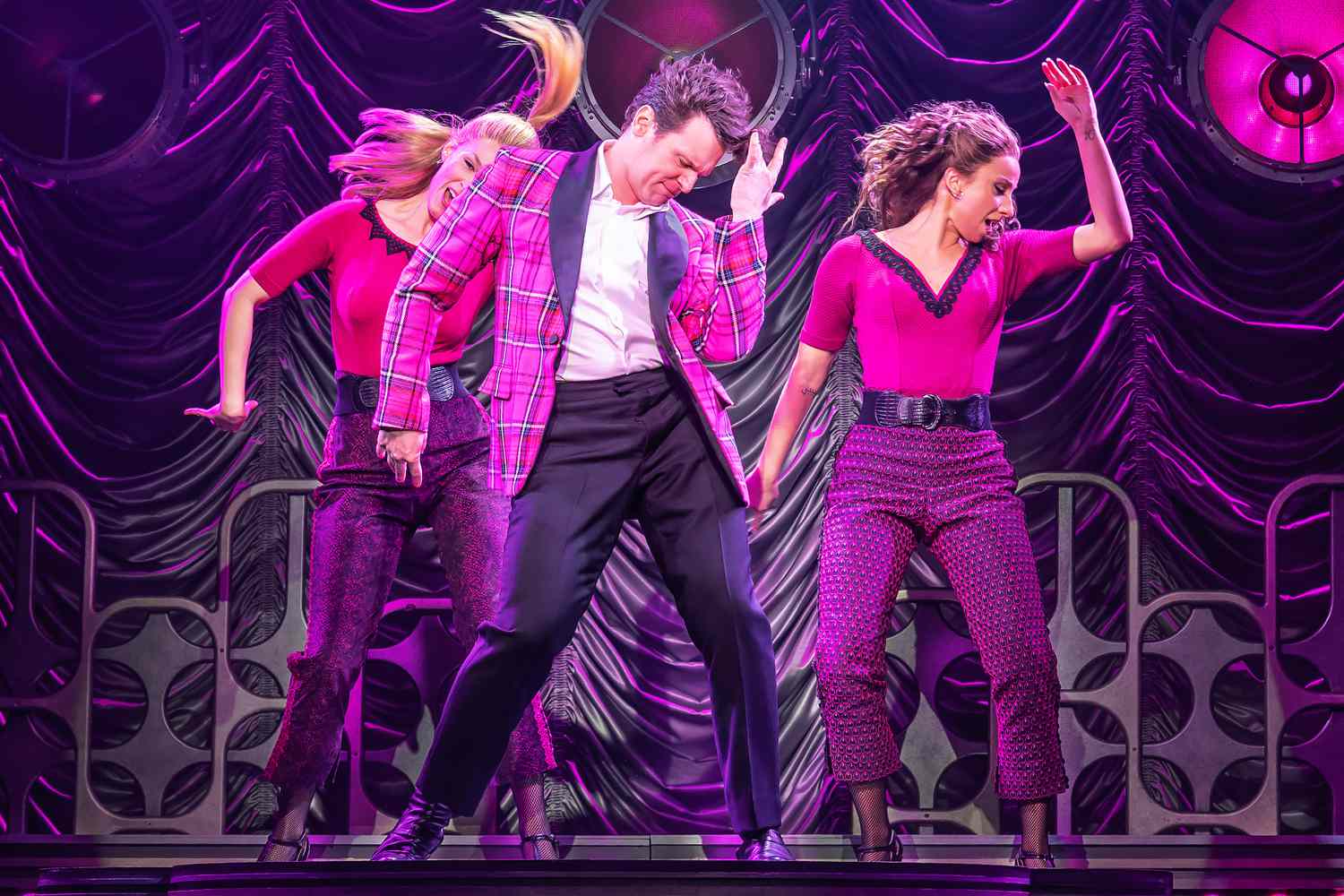By all accounts, Bobby Darin was a man who refused to be boxed in. He was a teen idol, a Sinatra-style crooner, a folk singer, a political activist, and above all, a relentless performer. In his short but meteoric career, he skipped across genres like stones on water — from the bubblegum pop of “Splish Splash” to the dramatic swing of “Mack the Knife,” to the aching simplicity of “If I Were a Carpenter.” Now, more than fifty years after Darin’s untimely death at the age of 37, Broadway’s favorite chameleon, Jonathan Groff, is channeling that same electric versatility in Just in Time — a genre-blending bio-musical that’s as much about the spirit of performance as it is about the man himself.
Currently playing at the Circle in the Square Theatre, the show is performed in the round — the space transformed into a swanky 1960s nightclub where Groff greets the audience not as Darin, but as himself. He flirts, he jokes, he dances between tables. Then, as if flipping a switch, he becomes Bobby Darin. And for the next two hours, the transformation is so complete, so tender, so joyful, you forget where Groff ends and Darin begins.
It’s an idea Groff has been sitting with for nearly a decade.
“We started talking about this eight years ago,” Groff says, his voice buzzing with the kind of excitement that doesn’t seem performative. “It began with the question: What if we celebrated Darin the way he lived — fast, passionate, wildly alive?”
Groff, now 40, isn’t just playing Darin — he’s honoring him. In his dressing room, he keeps a photograph of Darin alongside Liza Minnelli. His favorite Darin deep cut? A soulful track called “I Am.” His favorite performance? “The Judy Garland Show.” And don’t get him started on the YouTube video where Darin duets with Stevie Wonder — a magical, nearly-forgotten gem where the two artists riff off each other in sync.
“He could hold his own with every great entertainer,” Groff says, eyes gleaming. “Lucille Ball used to play canasta with her sister while playing Darin at the Copa on repeat. That’s the kind of reach he had.”
It’s no surprise, then, that Just in Time feels so alive. Groff’s portrayal is born of study and affection, but also of personal resonance. He doesn’t merely imitate Darin’s gestures or mimic his phrasing. Instead, he embodies Darin’s paradoxes: the bravado and the vulnerability, the swagger and the ache. The result is something more complex — a meeting point between two artists separated by time, yet kindred in soul.
Just in Time is more than a jukebox musical. Directed by Alex Timbers (Moulin Rouge!, Beetlejuice) and co-conceived by Groff and veteran producer Ted Chapin, the show is structured as a kind of time machine. It begins in the present — with Groff addressing the audience as himself — and slowly rewinds through Darin’s rise to fame, his battles with illness, and his constant reinvention.
The storytelling is clever and deeply meta. Groff isn’t just telling Darin’s story; he’s reflecting on his own life and career through Darin’s lens. At one moment, he’s talking about playing dress-up as Dorothy in a Pennsylvania barn. The next, he’s crooning “Beyond the Sea” in a velvet tuxedo. The cabaret tables and dual stages aren’t gimmicks — they’re tools of intimacy.
“Starting as myself, then shifting into Bobby — it’s not just theatrical,” Groff explains. “It’s essential. I want people to feel the same rush that he brought to the stage.”
Groff also notes how transformative it feels to play Darin now — in a moment when he can fully own his identity as an openly gay man.

“When I was starting out, there were a lot of closeted men playing straight on Broadway,” Groff says. “This is the first time I get to begin a show by declaring exactly who I am, and then step into someone like Bobby Darin — a playboy crooner who was, in many ways, the polar opposite of me. It’s powerful to live that truth onstage.”
Darin was more than just a pop star. He was a whirlwind of reinvention, long before the term “genre-swapping” became trendy. Today, artists like Beyoncé are hailed for defying categorization, but Groff points out that Darin was doing it half a century ago.
“Before Cowboy Carter was breaking rules, Bobby was already flipping the script,” Groff says. “He made his name with novelty songs, then pivoted to big-band swing, then again to protest folk music. He wrote ‘Dream Lover’ and ‘Simple Song of Freedom.’ That’s range.”
That range, Groff notes, is what made Darin so thrilling — and so difficult to define.
“I knew ‘Splish Splash,’ ‘Mack the Knife,’ and ‘If I Were a Carpenter,’” Groff admits. “But I didn’t know they were all by the same guy. That’s the kind of shape-shifter he was.”
And shape-shifting, it turns out, is something Groff knows a little about himself.
For Groff, every new role is a new life. From his breakthrough in Spring Awakening to his scene-stealing turn as King George in Hamilton, to his high-octane fight scenes in The Matrix Resurrections, Groff has never settled into a single type.
“Every project is its own life,” he reflects. “And I feel incredibly lucky to have lived so many creative lives already.”
He’s also deeply aware of time — how it slips by, how it shapes us. One story he shares is about the day his grandfather died — on Groff’s tenth birthday.
“The night before, we had a birthday party, and all I wanted to do was watch I Love Lucy VHS tapes,” he recalls. “I didn’t say goodbye to my grandfather. The next morning, he was gone.”
That memory has lingered with him ever since, not as a source of trauma, but as a formative lesson. Now, as he enters his forties, it’s taken on new meaning.
“When I blew out my candles this year, I realized: No more wishes. Just thank you. That’s where I’m at.”
Groff has never felt more creatively fulfilled than he does now. Coming off a Tony-winning turn in last year’s revival of Merrily We Roll Along, Just in Time is his second consecutive Broadway run, and yet he seems energized rather than exhausted.
“During The Matrix, I remember standing in the shower in Berlin thinking, ‘By Friday, I’ll have finished my fight scene with Neo. I can relax.’ But then I caught myself — I didn’t want to wish away the moment. I wanted to live it.”
That ethos is at the core of Just in Time. There’s an urgency to Groff’s performance, a feeling that he’s savoring every beat, every note, every glance with the audience. Friends who’ve seen the show say it’s clear how much joy he finds in it.
“A friend told me, ‘Jonathan, I just have this feeling you’re so happy up there, that whenever you leave this, there’s going to be some postpartum,’” Groff says with a laugh. “And he’s probably right. I’m dangerously into it.”
Still, he’s learned to trust the process of letting go — to know when a story has been fully told. With Merrily, he felt complete. Maybe he will with Just in Time, too. But for now?
“Right now, I’m Gollum,” he says, only half-joking. “This is my precious.”
At the heart of it all is Groff’s unwavering love for the stage. Despite film and TV success, he always returns to theater. And the reason is simple.
“There’s something primal about it,” he says. “The lights go down. There’s an audience. There’s a story to tell. That’s all you need.”
He compares it to performing in his dad’s barn back in Lancaster, Pennsylvania. That barn — and those childhood performances in heels — were his first steps toward becoming the artist he is today. Not much has changed, really. The venue’s just a bit bigger.

“That’s the through line,” Groff says. “It’s always been about telling stories. That’s why I do what I do.”
In Just in Time, Jonathan Groff isn’t just playing Bobby Darin. He’s living out a dream — his, Darin’s, and perhaps even the audience’s. It’s a celebration of artistry, identity, time, and the music that makes all of it matter.
As the curtain falls each night and Groff bows — sweat-slicked, grinning, heart full — he isn’t just taking a bow for himself. He’s taking one for Bobby, too.
Because you only die once. But if you know how, as Darin once said, you live lots of times.
Groff is living every one of them.



